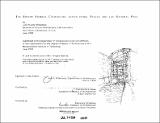The Boston Federal Courthouse : institutional places and the national face
Author(s)
Williamson, June Pauline
DownloadFull printable version (27.44Mb)
Other Contributors
Massachusetts Institute of Technology. Dept. of Architecture.
Advisor
Ellen Dunham-Jones.
Terms of use
Metadata
Show full item recordAbstract
Federal institutions are significant instruments for promoting national identity. In the United States these institutions, including the judicial system, claim authority from a point of origin (identified by such terms as "the founding fathers") as well as from the Western traditions which the "fathers" are said to have improved upon. This thesis explores the possibility of an architecture that seeks to more accurately communicate the invented and evolving nature of the law, typically presented as timeless. The intention is to support the anti-authoritarian democratic ideals of freedom and equality which such socially constructed institutions were designed to uphold and to which they must continually be held accountable by the citizenry. Institutions such as the law are subject to constant change and interpretation but the usual approach to the architectural design of buildings that house such federal institutions bolsters inaccurate notions of permanence and immutability, with the use of closed monolithic forms and reference to simplified, yet glorified historical styles. In a democracy, institutional places must be designed to acknowledge that they are situated in a realm of indeterminacy and antagonism and must be responsible to a multivalent public. They must be presented as subject to transformation, rather than as glorifying masks presenting a unified, singular national face. To this end, an alternative proposal was explored for the Boston Federal Courthouse, presently under construction according to a design by Henry N. Cobb.
Description
Thesis (M. Arch.)--Massachusetts Institute of Technology, Dept. of Architecture, 1994. Includes bibliographical references (p. 124-126).
Date issued
1994Department
Massachusetts Institute of Technology. Department of ArchitecturePublisher
Massachusetts Institute of Technology
Keywords
Architecture.